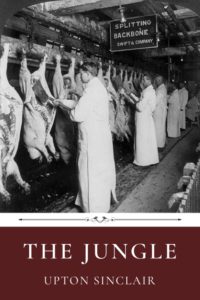The Fiction Spot
A snapshot review of a book related to the Non-fiction Feature
Also in this Weekly Bulletin:
The Non-fiction Feature: The Butchering Art by Lindsey Fitzharris
The Product Spot: Winix Air Purifier
The Pithy Take
As many may know, The Jungle is one of the most impactful novels in US history: Upton Sinclair’s descriptions of the meatpacking industry’s disgusting sanitary conditions (workers wading through blood, handling meat with unclean hands, buzzards filling the air) and terrible animal mistreatment resulted in the Meat Inspection Act and the Pure Food and Drug Act. Good, very good—animal and consumer welfare should always be of import.
But, the vast majority of The Jungle, which follows Lithuanian immigrant Jurgis Rudkus, is devoted to demonstrating how the great American Dream, soaked in blood, drags immigrants through the dirt. Jurgis and his wife Ona, both deeply in love and so brightly eager to begin their lives in the US, confront terror after terror—Ona is sexually harassed and prostituted, their children perish, and Jurgis, despite his best efforts, is shunted from miserable job to miserable job and succumbs to alcoholism. The poor immigrant life, unvarnished and battered by brutal (yet not unimaginable) turns of fate, reveals that justice is scarce and that kindness does not come often enough for people like them.
One could not stand and watch very long without becoming philosophical, without beginning to deal in symbols and similes, and to hear the hog-squeal of the universe. Was it permitted to believe that there was nowhere upon the earth, or above the earth, a heaven for hogs, where they were requited for all this suffering?
The Jungle
Author: Upton Sinclair
Publisher: Doubleday, Page & Co.
413 pages | 1905
Purchase
[If you purchase anything from Bookshop via this link, I get a small percentage at no cost to you.]
